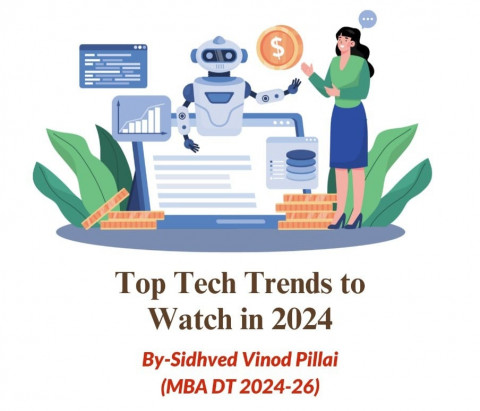
As we move into 2024, the landscape of technology continues to
evolve at a breakneck pace. Building on the trends of 2023, this year
promises further advancements that will shape the future across
various sectors. Here are the top technology trends to watch in 2024.
1. The Evolution of AI: Generative, Sustainable, and Ethical AI
Artificial Intelligence (AI) remains at the forefront of technological
innovation. In 2024, we will see broader adoption of AI technologies
across industries, with particular emphasis on generative AI,
sustainable AI, and ethical AI.
-
Generative AI: This technology will further enhance machines'
ability to mimic human creativity, leading to significant
breakthroughs in content creation, design, and more. -
Sustainable AI: Energy-efficient AI practices will become
standard, helping companies reduce their carbon footprint while
maintaining high performance. -
Ethical AI: Eliminating biases in AI decision-making systems will
be a priority, ensuring fairness and transparency in AI
applications.
The global AI market is projected to reach USD 1394.30 billion by 2029,
growing at a CAGR of 20.1%.
2. Advancements in Cloud Computing
Cloud computing trends in 2024 will continue to emphasize edge
computing, AI integration, and multi-cloud solutions. Companies are
expected to invest more heavily in public cloud services, moving away
from traditional IT solutions.
-
Edge Computing: Processing data closer to the source will
enhance speed and reduce latency. -
AI in the Cloud: Leveraging AI to optimize cloud operations will
improve efficiency and cost-effectiveness. -
Multi-Cloud Solutions: Enterprises will adopt multi-cloud
strategies to enhance flexibility and avoid vendor lock-in.
The global cloud computing market, valued at USD 368.97 billion in 2021, is expected to expand at a CAGR of 15.7%.
3. Quantum Computing and Cybersecurity
Quantum computing is set to revolutionize cybersecurity in 2024. The
development of quantum-safe encryption will be crucial in mitigating
risks posed by quantum computing.
-
Quantum Machine Learning: Algorithms will improve the
detection and prevention of cyber-attacks. -
Quantum-Safe Encryption: Ensuring data protection against
quantum threats will be a key focus area.
The global quantum cryptography market is expected to reach USD
476.83 billion by 2030, growing at a CAGR of 18.67%.
4. Super-App Development
The rise of super-apps will be driven by digital disruptions, hyper
automation, and composable business models. Low-code and no-code
platforms will play a significant role in this development.
- Low-Code/No-Code Platforms: These platforms democratize app
development, allowing for faster and more efficient creation of
Super-apps. - Composable Business Models: Enterprises will leverage these
models to adapt quickly to changing market needs.
The low-code development platform market is projected to grow at a
CAGR of 25.26% from 2022-2027, reaching USD 64.56 billion by 2026.
5. The Metaverse and Immersive Experiences
The metaverse will continue to expand, driven by technologies like 5G, AI, and extended reality (XR).
-
Interoperable Applications: Developing applications that work
seamlessly across different devices will be crucial. -
Immersive Experiences: Businesses will create more engaging and
interactive digital worlds.
The market opportunity for the metaverse is expected to reach USD
800 billion by 2024
6. 5G and the Journey to 6G
The deployment of 5G will focus on high speeds, ultra-low latency, and
increased IoT connections, setting the stage for the eventual transition
to 6G.
-
5G Applications: Industries like gaming, education, and
manufacturing will benefit from 5G's capabilities. -
Towards 6G: Faster speeds, lower latency, and more bandwidth
will drive productivity gains.
5G network subscriptions are expected to reach 4.4 billion by the end
of 2027, with a CAGR of 10.3% from 2022 to 2027.
7. Blockchain and Web 3.0
Blockchain technology will underpin the growth of Web 3.0,
emphasizing interoperability, smart contracts, and decentralization.
-
Interoperability: Seamless integration across different platforms
will enhance user experience. -
Smart Contracts: Automation and security in transactions will be
key benefits.
The global Web 3.0 market size is expected to reach USD 81 billion by 2030.
8. Sustainability and Green Technology
Sustainability will be a core focus, with businesses adopting
traceability, analytics, and renewable energy.
-
ESG Goals: Enterprises will prioritize environmental, social, and
governance goals. -
Green Technology: Investments in sustainable technology will
drive progress in various sectors.
The global green technology and sustainability market is projected to
grow from USD 17.8 billion in 2022 to USD 60.7 billion by 2027.
9. Upskilling and Reskilling the Workforce
Upskilling and reskilling employees in both technical and soft skills will
remain critical.
-
Productivity Gains: Companies can expect increased productivity
and work quality from a well-trained workforce. -
Future Preparedness: Upskilling prepares employees for future
challenges and enhances overall performance.
10. Advancements in Robotics
The field of robotics will continue to expand, enhancing collaboration
between humans and robots.
-
Advanced Sensors and Algorithms: These will ensure safe
interactions and improve productivity. -
Complex Task Automation: Robots will take on more complex and
hazardous tasks.
The global humanoid robot market is estimated to reach USD 17.32
billion by 2028.
Conclusion
The technology trends of 2024 will build on the advancements of 2023, driving innovation and growth across multiple industries. From AI and cloud computing to quantum computing, super-apps, and the
metaverse, these trends will shape the future of technology and its
impact on society. As businesses and individuals adapt to these
changes, staying informed and agile will be key to harnessing the full
potential of these emerging technologies.
By Sidhved Vinod Pillai (MBA DT)


